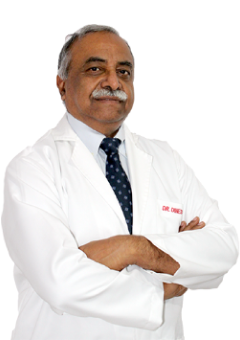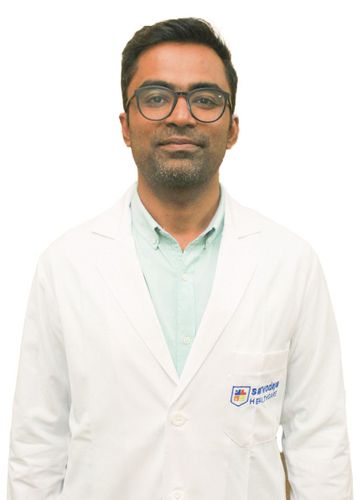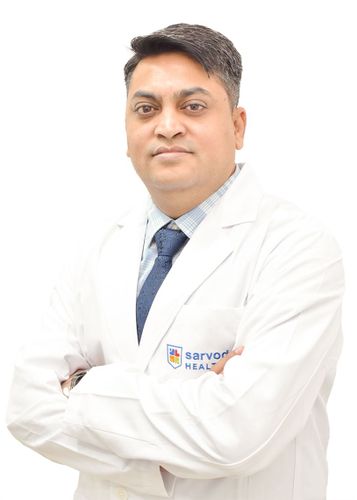Overview
Pancreatic cancer starts in the pancreas and often develops quietly, with few symptoms until it is advanced. Early evaluation is vital if there are warning signs such as jaundice, unexplained weight loss, or persistent upper abdominal/back pain.
At Sarvodaya Cancer Institute, we deliver comprehensive Pancreatic Cancer Treatment in Faridabad, Delhi NCR, combining expert diagnostics, advanced surgery, precision radiotherapy, systemic therapies, and strong supportive care. Multidisciplinary planning ensures a personalised approach, aiming for the best possible outcomes and quality of life, and improved pancreatic cancer survival rate.
Pancreatic cancer symptoms
- Persistent upper abdominal pain, sometimes radiating to the back
- Jaundice (yellowing of skin/eyes) with dark urine and pale stools
- Unexplained weight loss
- Loss of appetite
- Nausea and vomiting
- New or worsening diabetes
- Oily, difficult-to-flush stools (steatorrhoea)
- Fatigue or general weakness
- Feeling of fullness
Pancreatic cancer causes
- Age, genetics, and family history (BRCA, Lynch, strong family history)
- Lifestyle factors
- Environmental and dietary factors (processed/high-calorie diets, certain exposures)
- New-onset diabetes without a clear cause
- Older age as a general risk factor
Diagnosis of Pancreatic Cancer
Fast and accurate diagnosis of pancreatic cancer ensures safe and effective treatment. At the Best Cancer Hospital in Delhi NCR, expert teams provide advanced care with precision and compassion.
- Clinical assessment and labs
A focused evaluation includes symptom review, physical examination, and blood tests like liver function and CA19-9, helping detect abnormalities and guide the next diagnostic steps effectively.
- High-quality imaging
Contrast-enhanced CT remains the gold standard for diagnosing and staging pancreatic cancer, while MRI/MRCP provides ductal assessment and PET-CT is reserved for particularly complex or unclear situations.
- Endoscopic ultrasound (EUS) with tissue sampling
EUS allows high-resolution imaging of the pancreas and enables fine-needle aspiration or biopsy to obtain tissue for histology, tumour confirmation, and detailed molecular profiling when needed.
- Biliary/pancreatic duct evaluation
ERCP or MRCP is used to detect and evaluate bile or pancreatic duct obstruction, with stent placement possible to relieve jaundice and restore normal bile flow.
Treatment of Pancreatic Cancer
Care is personalised to tumour stage, location (head, body, or tail), biology, and patient fitness, with clear goals for cure or control by the best oncologist in Faridabad.
A team of GI surgeons, oncologists, radiologists, endoscopists, and pathologists collaborate to design a personalised treatment plan focused on achieving the best outcomes and preserving patient quality of life.
- Surgery (Open, Laparoscopic, Robotic): For resectable disease, options include Whipple, distal, or total pancreatectomy. Minimally invasive and robotic techniques often reduce blood loss, postoperative pain, and recovery time significantly.
- Chemotherapy: Neoadjuvant chemotherapy, with or without radiotherapy, is used to shrink borderline resectable tumours, improving the likelihood of complete surgical removal and optimising patient outcomes.
- Systemic therapy: Advanced regimens like FOLFIRINOX or gemcitabine-based combinations, plus targeted therapies for select molecular profiles, aim to control disease progression and extend survival in eligible patients.
- Precision radiotherapy: Techniques such as IMRT or IGRT deliver high-dose radiation accurately, controlling local tumour growth while protecting nearby healthy organs from unnecessary exposure and potential damage.
- Supportive and palliative care: Includes biliary stenting for obstruction, effective pain control, nutritional guidance, enzyme replacement, and comprehensive psychosocial support to maintain quality of life.
Prevention & Lifestyle Modification
Our team at Sarvodaya Hospital, a leading Cancer Hospital in Faridabad, supports you in making daily choices that lower pancreatic cancer risk and protect overall health. Here’s how you can safeguard your pancreas and well-being.
- Quit smoking and limit alcohol: Stopping tobacco use and keeping alcohol intake minimal are key steps to lowering pancreatic cancer risk and supporting long-term digestive and metabolic health.
- Maintain a healthy weight and stay active: Engage in weekly aerobic plus resistance exercise to manage weight, improve insulin sensitivity, and reduce inflammation linked to pancreatic disease.
- Balanced, plant-forward diet: Eat plenty of vegetables, fruits, legumes, whole grains, and healthy fats. Such diets support pancreatic health and reduce chronic inflammation and cancer risk.
- Manage metabolic and chronic conditions: Control diabetes, blood pressure, and cholesterol; address risk factors for chronic pancreatitis to lower chances of pancreatic damage over time.
- Seek prompt medical assessment: Report persistent abdominal symptoms or new-onset diabetes without an obvious cause to enable early detection and timely intervention.
Pre–Post Treatment Lifestyle Modifications
Pre treatment
- Adopt a protein‑rich, nutrient‑dense diet; optimise diabetes control to improve surgical and chemotherapy tolerance.
- Regular walking and light resistance build stamina; breathing exercises reduce pulmonary risk around major surgery.
- Coordinate anticoagulants, heart/lung optimisation, and pancreatic enzyme needs; plan vaccination timing if immunosuppression is expected.
- Consider timely biliary stenting for obstructive jaundice; manage pain, nausea, and nutrition early.
- Set recovery goals, arrange support, and understand hospital pathways, drains, and potential enzyme/insulin requirements.
Post treatment
- Walk early, follow pain and nutrition plans; small, frequent, high‑protein meals aid healing and weight maintenance.
- Use pancreatic enzyme replacement as advised; monitor and manage blood sugars, especially after resection.
- Keep incisions clean/dry; prevent constipation; report ongoing steatorrhoea, vomiting, or dehydration promptly.
- Seek urgent care for fever, worsening pain, jaundice, chest pain, or calf swelling; attend scheduled reviews, scans, and CA19‑9 monitoring where applicable.












